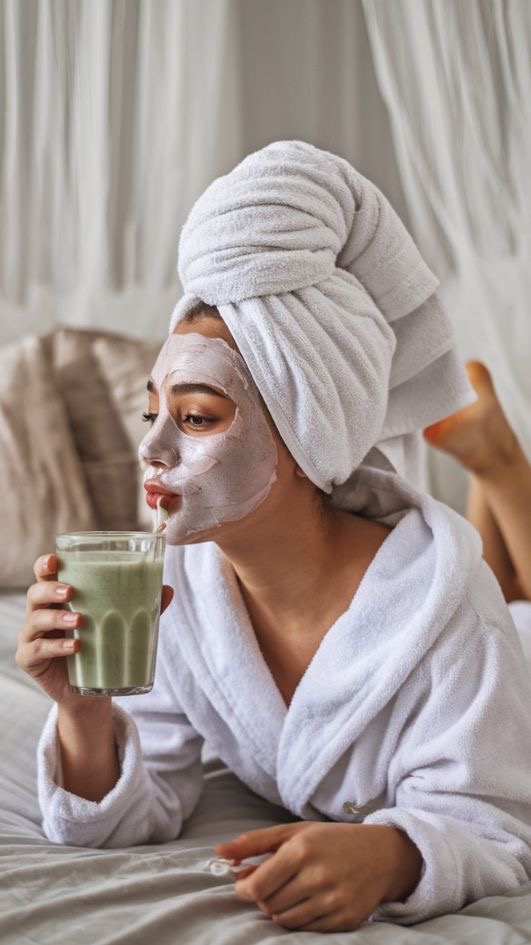
Discover how to create the perfect skincare routine for your skin type.
Explore natural skincare tips, acne solutions, and expert advice for achieving glowing, healthy skin.
Introduction: Why Skincare Matters
Your skin is more than just what you see in the mirror; it’s your body’s largest organ and acts as a protective barrier against germs, pollution, and harsh weather. Healthy skin not only looks great but also reflects a balanced state of health both inside and out.
In today’s world, filled with countless skincare products and trends, it’s easy to feel overwhelmed. Some view skincare as a beauty ritual, while others see it as an unnecessary indulgence. However, the truth is that skincare is a vital part of self-care. When your skin feels clean, hydrated, and protected, you naturally feel more confident and comfortable in your own skin.
Understanding Your Skin Type
Before diving into a skincare routine, it’s crucial to identify your skin type. This knowledge will help you choose the right products and avoid wasting money.
– Normal Skin: If your skin feels balanced, not too oily or dry then you likely have normal skin. It typically looks smooth, has few blemishes, and responds well to most products.
– Oily Skin: If your face tends to shine throughout the day, especially on your forehead, nose, and chin, you have oily skin. You might also notice blackheads, acne, or enlarged pores.
– Dry Skin: If your skin feels rough, tight, or flaky, you probably have dry skin. It may also become itchy or irritated after washing.
– Combination Skin: If different areas of your face behave differently like oily in the T-zone but dry on the cheeks then you have combination skin.
– Sensitive Skin: If your skin reacts easily to products, turns red, or burns after using certain creams, you likely have sensitive skin.
Understanding your skin type is the first step toward selecting products that will help balance and protect it.
The Basic 5-Step Skincare Routine
Step 1: Cleansing
Cleansing is essential for removing sweat, oil, makeup, and dirt from your face. Choose a gentle cleanser that suits your skin type. For oily or acne-prone skin, opt for gel or foam cleansers with ingredients like salicylic acid to help unclog pores. If you have dry or sensitive skin, look for hydrating cream cleansers containing glycerin or ceramides. Avoid harsh soaps or alcohol-based cleansers, as they can strip your skin of its natural oils. Aim to wash your face twice daily, once in the morning and once at night.
Step 2: Exfoliating
Exfoliation helps slough off dead skin cells that can make your complexion look dull. It also allows your skincare products to penetrate better. Use a chemical exfoliant, such as alpha hydroxy acids (AHA) or beta hydroxy acids (BHA), two to three times a week. Steer clear of abrasive scrubs, as they can damage your skin and cause irritation. Regular exfoliation can help reduce acne scars and dark spots, particularly in darker skin tones.
Step 3: Toning
Toners are designed to help restore your skin’s pH balance and tighten pores after cleansing. If you have oily skin, choose a toner with witch hazel or niacinamide. For dry skin, look for soothing ingredients like rose water or hyaluronic acid. Avoid toners with alcohol, as they can dry out your skin. Applying toner also preps your skin for the next steps in your routine.
Step 4: Moisturizing
Moisturizing is key to keeping your skin hydrated, soft, and supple. Even if you have oily skin, moisture is crucial for maintaining balance. People with oily skin should opt for lightweight, oil-free gels or lotions, while those with dry skin should use richer creams that contain shea butter, ceramides, or hyaluronic acid. Combination skin types often benefit from gel-cream formulas. Don’t forget to moisturize twice daily, after cleansing in the morning and before bed.
Step 5: Sun Protection
This is arguably the most important step, yet it’s often overlooked. Sunscreen protects your skin from harmful ultraviolet (UV) rays that can lead to premature aging, dark spots, and even skin cancer. Everyone, regardless of skin tone, should use sunscreen daily. Aim for a broad-spectrum SPF of at least 30, even on cloudy days. Reapply every two to three hours when outdoors. If you have darker skin, consider mineral-based sunscreens that won’t leave a white cast and contain ingredients like zinc oxide or titanium dioxide.
Skincare for Common Skin Concerns
Acne and Breakouts
Acne is caused by excess oil, clogged pores, and bacteria. To manage breakouts, wash your face twice daily and use products that contain benzoyl peroxide or salicylic acid. Avoid squeezing pimples, as this can lead to scarring. Stay hydrated and limit greasy or sugary foods that may trigger breakouts.
Hyperpigmentation and Dark Spots
Hyperpigmentation occurs when your skin produces too much melanin in certain areas, leading to uneven skin tone. This condition is more common in darker skin tones. To lighten dark spots, use products with vitamin C, niacinamide, or kojic acid. Sunscreen is essential; without it, dark spots can worsen. Remember, consistency is key and results may take several weeks to show.
Dryness and Flakiness
Dry skin can result from cold weather, harsh soaps, or dehydration. Use a gentle cleanser, apply moisturizer right after washing, and consider face oils like jojoba or argan oil. Avoid very hot water and strong cleansers that strip your skin of natural oils.
Aging and Wrinkles
Wrinkles are a natural part of aging, but sun damage and stress can make them appear sooner. To minimize fine lines, use serums containing retinol, peptides, or antioxidants. Always wear sunscreen and maintain a healthy diet rich in fruits, vegetables, and green tea. Adequate sleep and hydration also contribute to youthful skin.
Sensitive Skin
Sensitive skin requires extra care. Use fragrance-free and hypoallergenic products, and patch-test any new product before applying it to your entire face. Avoid over-exfoliating and hot water. If irritation continues, consult a dermatologist.
Best Natural Ingredients for Healthy Skin
Natural skincare ingredients can be potent when used correctly. Aloe vera is fantastic for soothing irritation and hydrating the skin. Honey is a natural antibacterial that brightens dull complexions when used as a mask. Turmeric can reduce inflammation and fade dark spots when mixed with honey or yogurt. Shea butter deeply moisturizes and protects dry skin, while green tea tones the skin and reduces redness thanks to its antioxidants. Coconut oil can effectively remove makeup and soften the skin, but those prone to acne should avoid it, as it can clog pores.
Skincare Routine for Men
Men’s skin is generally thicker and oilier than women’s, but it still needs daily care. A basic routine includes cleansing twice a day, especially after shaving or sweating. Use a mild aftershave balm to soothe the skin. Exfoliate two to three times a week to prevent ingrown hairs. Don’t forget to apply moisturizer and sunscreen every morning. Shaving after a warm shower can help soften the beard and reduce the risk of razor bumps or irritation.
Skincare Routine for Women
Women’s skin often undergoes hormonal changes that can affect oil production, texture, and sensitivity. During menstruation, skin may become more sensitive or oily, so it’s best to use gentle cleansers and oil-control products. During pregnancy, avoid retinol or harsh chemical peels, opting instead for safer ingredients like vitamin C or niacinamide for brightening. At night, apply nourishing serums containing hyaluronic acid or peptides to support cell repair and keep your skin plump and smooth.
Seasonal Skincare Tips for Tropical Regions
In tropical climates like Nigeria, your skincare routine should adapt to the changing weather.
– Dry Harmattan Season: Your skin may lose moisture quickly, so opt for thicker creams, shea butter, or body oils to lock in hydration. Remember to apply lip balm regularly to prevent chapped lips, and try to avoid long hot showers that can strip your skin of essential oils.
– Rainy Season: The humidity can make your skin feel greasy or prone to breakouts. Stick to lightweight, non-greasy moisturizers and oil-free sunscreens. Always remove makeup before bed, and remember that UV rays can still penetrate clouds, so sunscreen is important even on overcast days.
Top Skincare Mistakes to Avoid
Many people unintentionally harm their skin. Common mistakes include sleeping with makeup on, which clogs pores and leads to breakouts, and over-exfoliating, which can damage the skin barrier. Skipping sunscreen, especially if you have darker skin, can result in hyperpigmentation and premature aging.
Using too many products at once can confuse your skin and cause irritation. Don’t forget to care for areas like your neck and hands, which can show signs of aging early. Avoid washing your face with hot water, as it can dry out your skin. Resist the urge to pick at pimples, and remember to clean your makeup brushes regularly. Most importantly, stay hydrated and be patient; healthy skin comes from consistency, not overnight fixes.
Frequently Asked Questions About Skincare
What is the best skincare routine for beginners?
Start simple: cleanse, tone, moisturize, and apply sunscreen every morning. You can gradually add serums or exfoliants as your skin adjusts.
How often should I exfoliate?
Two to three times a week is sufficient. Over-exfoliating can weaken your skin barrier and lead to redness.
Can I rely only on natural remedies?
Yes, but be cautious. Natural doesn’t always mean gentle. Always patch-test first and avoid unverified DIY recipes that could irritate your skin.
What is the best way to treat dark spots?
Use vitamin C, niacinamide, and sunscreen daily. Avoid bleaching creams, as they may lighten your skin unevenly and cause damage.
How long before I see results?
Consistency is essential. Most products take at least four to eight weeks to show visible improvement, so stick to your routine and be patient.
Conclusion: Skincare Is Self-Care
Skincare isn’t about perfection; it’s about respecting your body and health. Whether you prefer natural remedies or modern serums, what matters most is consistency, protection, and understanding your skin’s needs.
Gently cleanse, deeply hydrate, and never skip sunscreen. Maintain a healthy diet, get enough rest, and manage stress. Over time, you’ll not only notice clearer skin but also feel greater confidence and comfort in your own body.
Remember, healthy, glowing skin doesn’t happen overnight, it’s the result of small, consistent steps taken every day. Treat your skin with kindness, and it will reward you with radiance and resilience.



